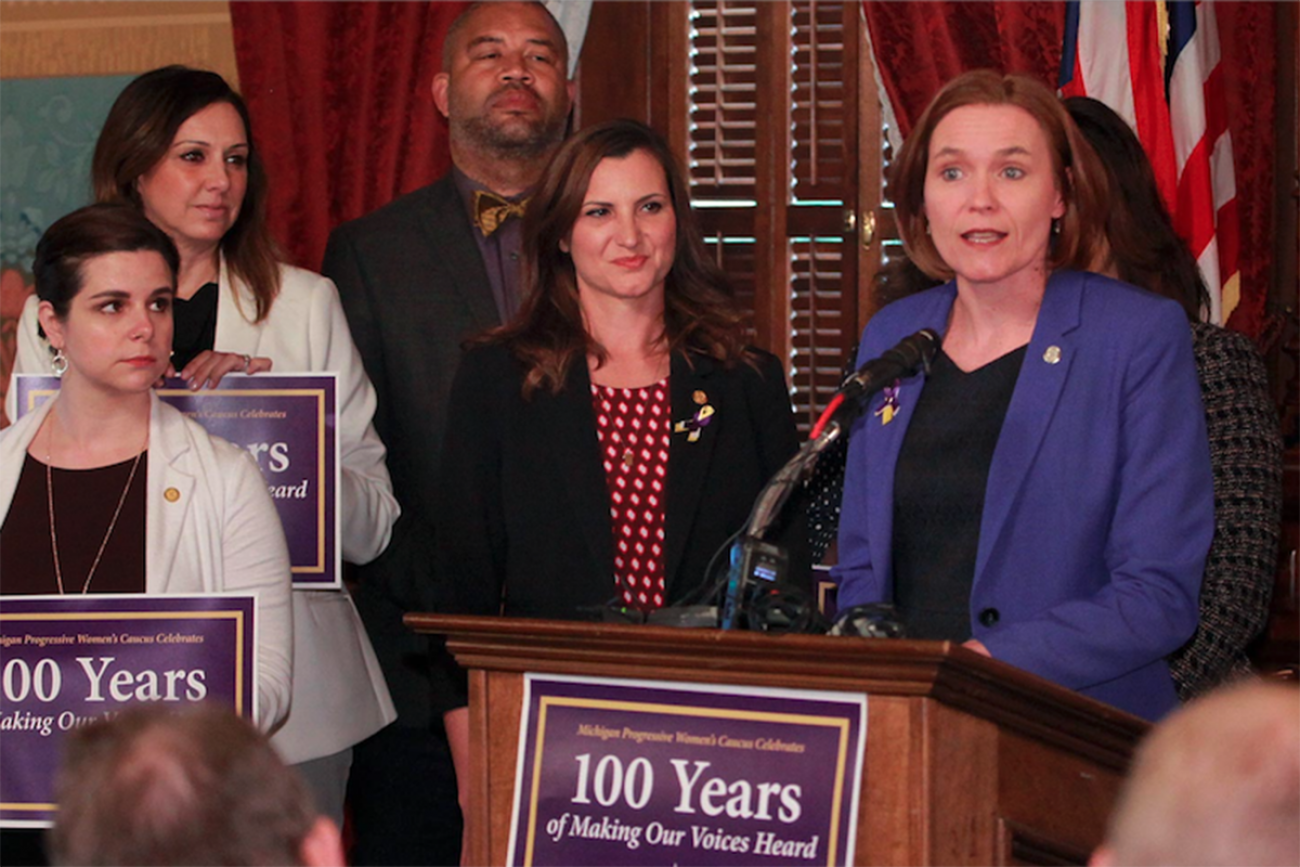Michigan Democrats aim to tighten environment regs, reduce industry control

- Democrats aim to reverse Republican policies that curtailed Michigan’s environmental regulatory power
- While environmentalists support the effort, Industry groups are wary
Democratic leaders say they want to scrap Republican laws that limited Michigan’s environmental regulatory power. But the effort is likely to face pushback from industry groups which argue too much oversight is bad for business.
Senate Majority Leader Winnie Brinks told Bridge Michigan that Democrats want to repeal a 2018 law that prevents Michigan regulators from enacting stronger pollution control standards than those set in federal law.
It’s just one of several Republican-backed laws — from environmental review committees that critics dubbed “polluter panels,” to the controversial “ban on bans” of plastic bags — that could soon be reconsidered.
Related:
- Michigan Democrats aiming to erase business friendly environmental laws
- Michigan Republicans move to block Gov. Whitmer’s environmental overhaul
- Republicans: Michigan shouldn’t regulate more strictly than Washington
Going beyond the feds
First in Democrats’ crosshairs is the “no stricter than federal” law enacted during the final days of Republican Gov. Rick Snyder’s second term. The law, sponsored by then-Rep. Triston Cole, R-Mancelona, added language to Michigan’s Administrative Procedures Act that prohibits state agencies from setting rules more stringent than those set by the feds.
Under the law, regulators can only get around that prohibition in an emergency, or if a state agency director finds a “clear and convincing need.”
The limit on state power applies to all areas of state regulation. But critics say it especially undercuts Michigan’s ability to set logical pollution regulations for a state with some of the country’s most abundant water resources, and some of its most alarming pollution concerns.
“Environmental policy should not be cookie-cutter,” Brinks told Bridge last week. “We have very different needs than, say, a state in the southwest or even in the southeast.”
Brinks referenced Michigan’s efforts to regulate PFAS contamination as an example. After Michigan became a national hotbed of PFAS contamination, Whitmer in 2019 directed the state Department of Environment, Great Lakes and Energy to limit the toxic compounds in residents’ drinking water. That was only possible because of a loophole in Michigan’s “no stricter” law: While the law stops Michigan regulators from exceeding federal drinking water regulations, it is silent on what state regulators should do about chemicals like PFAS that the feds do not regulate.
“That allowed us to do our own research (on PFAS) and figure out what needed to happen, because the federal government moves so slowly,” Brinks said.
Michigan’s lead and copper rule, enacted in 2018 in the wake of the Flint water crisis, would not have been possible if Michigan’s “no stricter” rule had been in place at the time.
But the “no-stricter” law largely prohibits Michigan from more strictly regulating other environmental concerns in Michigan — something environmentalists often urge regulators to do.
“Federal standards are meant to be a bare minimum,” said Charlotte Jameson, chief policy officer for the Michigan Environmental Council.
One example is hexavalent chromium, a toxic metal compound linked to lung cancer and a host of other health issues, including asthma and bronchitis. The federal drinking water limit for chromium does not differentiate between toxic hexchrome and more benign trivalent chromium.
Michigan environmentalists began calling for stricter limits last summer, after a spill from a Wixom-based chrome plating facility resulted in a prolonged “don’t touch” advisory in the Huron River.
“I am quite certain that there are things, like hexchrome, that need to have a look (at possible regulations),” Brinks said. “And we should be working with regulators to see what's on that list.”
Democrats have previously tried to repeal the “no stricter” law, but those efforts went nowhere in a Republican-controlled legislature. The latest repeal bill, filed last week, is sponsored by Democratic Sen. Sean McCann of Kalamazoo, who chairs the Senate energy and environment committee.
Industry officials are not enthusiastic about a potential change. They argue that aligning Michigan’s standards with federal regulations provides certainty for businesses, and tougher standards may discourage companies from setting up shop in Michigan.
“With this bill, is the sky falling down? We don't think it is,” said Mike Alaimo, director of environmental and energy affairs for the Michigan Chamber of Commerce. “But I do think it's incredibly important that we are cognizant of where regulatory agencies are heading with certain policy regimes. And we do see (McCann’s bill) confirming some of our concerns.”
Chuck Lippstreu, president of the Michigan Agri-Business Association, said his group shares those concerns. Businesses need “a predictable regulatory framework,” he said, and many are already subjected to strong regulations under federal law.
EGLE spokesperson Hugh McDiarmid said the agency would support repealing the law, which he said would “give Michigan additional flexibility to address Michigan-specific issues.”
Industry voices and plastic bags
The campaign to reverse Republican environmental policies isn’t likely to end there.
Environmentalists say they also expect lawmakers to do away with three state panels established under Snyder — the Environmental Science Advisory Board, Environmental Permit Review Commission and the Environmental Rules Review Committee — that gave industry representatives new ways to intervene in state environmental decisions.
Shortly after taking office, Democratic Gov. Gretchen Whitmer attempted to scrap the panels, but was blocked by Republican legislators.
Industry groups lauded the committees for providing needed transparency about how regulators make decisions, while environmentalists called them “polluter panels” designed to undermine the state’s authority.
“It's never good to have the very industries that are being regulated have a seat at the table to decide what those regulations look like,” said Lisa Wozniak, executive director of the Michigan League of Conservation Voters.
Some in the business community object to that characterization.
Alaimo called a vote to remove the review panels “a vote against transparency.” But Lippstreu, who represents agricultural interests on the rules review committee, said it’s fair to consider what value the panels provide in exchange for the resources it takes to operate them.
“I think it is a legitimate question to ask whether the panels are critically necessary to make sure every voice is heard on state rulemaking,” Lippstreu said.
And then there is the question of whether local governments should be able to craft their own environmental standards.
Sen. Jeff Irwin, D-Ann Arbor, told Bridge last month he plans to attempt to repeal the law that bans local municipalities from banning plastic bags.
Then-Sen. Jim Stamas, R-Midland led the charge for the 2016 law in response to a Washtenaw County policy that would have charged a 10-cent fee on paper and plastic bags dispensed at grocery stores. But with the state law in place, Washtenaw County’s ban never took effect.
And Brinks expressed support for strengthening Michigan’s polluter pay laws, a term for environmental contamination cleanup standards.
Michigan’s standards were once the nation’s most aggressive, extending liability for contaminated sites to both current and former owners. But lawmakers weakened the law during Republican Gov. John Engler’s tenure, narrowing who can be held liable and shifting its focus from cleanup to containment.
The details of how and whether to strengthen “polluter pay” are still being discussed.
“We just got started in the majority,” Brinks said. “So we're working through some of those issues and seeing where we have high levels of agreement on policy approaches to certain problems.”
Michigan Environment Watch
Michigan Environment Watch examines how public policy, industry, and other factors interact with the state’s trove of natural resources.
- See full coverage
- Subscribe
- Share tips and questions with Bridge environment reporter Kelly House
Michigan Environment Watch is made possible by generous financial support from:
Our generous Environment Watch underwriters encourage Bridge Michigan readers to also support civic journalism by becoming Bridge members. Please consider joining today.
See what new members are saying about why they donated to Bridge Michigan:
- “In order for this information to be accurate and unbiased it must be underwritten by its readers, not by special interests.” - Larry S.
- “Not many other media sources report on the topics Bridge does.” - Susan B.
- “Your journalism is outstanding and rare these days.” - Mark S.
If you want to ensure the future of nonpartisan, nonprofit Michigan journalism, please become a member today. You, too, will be asked why you donated and maybe we'll feature your quote next time!






